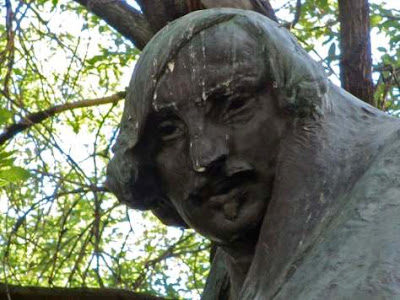EXHUMATION OF NIKOLAI GOGOL, JUNE, 1931
EXCERPT FROM "Gogol's Head: the Misadventures of a Purloined Skull"
6
У
Гоголя Голову Украли (The Head Gone Missing)
In his Last Will and
Testament Nikolai Vasilievich had stipulated that his grave be made inviolate.
He wished to lie so far beneath the ground that no one could ever reach him.
Furthermore, he had left instructions that he not be buried until his body showed
clear signs of decomposition, for in his worst nightmares he conjured up scenes
of himself, poor Nikosha, momma’s little boy, awaking below ground from a deep
sleep, then shrieking and clawing at the lid of the coffin.
The heat
was oppressive now. The spectators ran out of tea. They improvised hand-held
fans from newspaper pages. They sat waiting, fanning themselves, watching the
diggers. Their conversation had petered out, and Lidin was too sweaty and tired
to provide further literary entertainment. Late in the afternoon the exhausted
diggers came upon a brick vault that proved incredibly difficult to breach.
They shoveled around it in a variety of directions, searching for a way inside.
Bakhrushkin suggested digging eastwardly, since he had heard that in Orthodox
burials the head of the deceased must be directed toward the east.
Long since
fed up with the admonitions of those who hung around watching, the shovelers
spit in disgust. They were silently contemptuous of these idlers who had never
worked by the sweat of their brows, like good honest peasants and workers. Then
the shoveler-spitters thought twice about what they had done, worried that such
disgusted spitting would offend the dead. So they spit three times over their
left shoulders to ward off evil; after that they proceeded to dig toward the
east.
Twilight (the summer sumerki) was setting in when they
finally found an opening in the brick vault, then managed to get a grip on the
wooden coffin inside. Holding their breath, saying nothing now, the tea
drinkers gathered around and gaped. A large throng of nebulous bystanders
hovered behind them. Lidin, smiling, tried to ease the tension that hung upon
the scene like a black cloud.
--He
thought, old mole, that he had dug himself in way down deep.
No one said
anything to that.
--He
thought the interlopers would never get to him.
No one said
anything.
--But he
had another think coming.
Lidin
looked around expectantly, waiting for the appreciative laughter that never
materialized.
The
laborers dragged the coffin out of the vault. Its upper planks were rotted, but
the sides of the casket were still in good shape—they had brass corners and
handholds, with well-preserved cerulean-lilac braided galloons.
The workers
pulled away the rotted planks and stepped aside. They took off their hats in a
gesture of respect. There he was: Nikolai Vasilievich Gogol, the man who had
written the best play in all of Russian literature (The Inspector General), the best short story in all of Russian
literature (“The Overcoat”), and the best twentieth-century modernist novel
ever written in the nineteenth century (Dead
Souls).
The first
thing they noticed was that the head was gone. The remains began at the bones
of the neck. For a long, long time the gapers stood there in awkward silence.
They were in the presence of something awe-inspiring: the great writer of the
Russian land lay there in front of them, but minus his head. Finally,
Bakhrushkin wiped the astonishment off his portly brow and spoke, whispering.
--Look at that,
will you. Someone has made off with the skull.


No comments:
Post a Comment